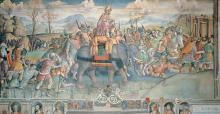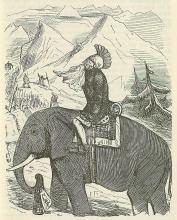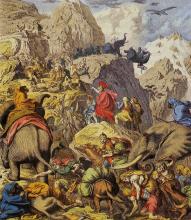(1) Hāc igitur, quā dīximus, aetāte cum patre in Hispāniam profectus est. Cuius post obitum, Hasdrubale imperātōre suffectō, equitātuī omnī praefuit. Hōc quoque interfectō, exercitus summam imperiī ad eum dētulit. Id Karthāginem dēlātum pūblicē comprobātum est.
(2) Sīc Hannibal, minor quīnque et vīgintī annīs nātus imperātor factus, proximō trienniō omnēs gentēs Hispāniae bellō subēgit; Saguntum, foederātam cīvitātem, vī expugnāvit; trēs exercitūs maximōs comparāvit.
(3) Ex hīs ūnum in Āfricam mīsit, alterum cum Hasdrubale frātre in Hispāniā relīquit, tertium in Italiam sēcum dūxit. Saltum Pȳrēnaeum trānsiit. Quācumque iter fēcit, cum omnibus incolīs cōnflīxit: nēminem nisi victum dīmīsit.
(4) Ad Alpēs posteāquam vēnit, quae Italiam ab Galliā sēiungunt, quās nēmō umquam cum exercitū ante eum praeter Herculem Grāium trānsierat, quō factō is hodiē saltus Grāius appellātur, Alpicōs cōnantēs prohibēre trānsitū concīdit; loca patefēcit, itinera mūniit, effēcit, ut eā elephantus ōrnātus īre posset, quā anteā ūnus homō inermis vix poterat rēpere. Hāc cōpiās trādūxit in Italiamque pervēnit.
notes
After his father's death Hannibal gains control of the army and campaigns in Spain (1–2). He crosses the Alps in November 218 BC and invades Italy (3–4).
(1) quā dīximus: "of which I spoke [above]" in 2.3. quā: the case of the relative pronoun is attracted to the case of its antecedent, hāc...aetāte (AG §306a); quam dīximus would the more regular construction.
dīximus: ancient authors often referred to themselves using plural forms, especially in prose. Although the precise connotation of this common usage is debatable, it does not convey haughtiness or pretension, as the use of English "we" might in a similar circumstance (11.5)
cuius: i.e., Hamilcar; connective relative (AG §308f; see above 2.4). Hamilcar was killed in 229 BC, either in battle by a flaming cart, or when he was ambushed while crossing a river.
Hasdrubale imperātōre suffectō: ablative absolute, "when Hasdrubal had been appointed replacement commander." suffectō: > sufficiō, the usual word for a person who substituted for a deceased or deposed magistrate, in this case referring to Hasdrubal "the Fair," brother-in-law of Hannibal and son-in-law of Hamilcar (not to be confused with Hasdrubal Barca, Hannibal’s brother, who was defeated at the Battle of Metaurus in 207 BC).
praefuit: > praesum + dative, equitātuī omnī. Hannibal was 18 when he became leader of the Carthaginian cavalry.
hōc quoque interfectō: ablative absolute. hōc: i.e. Hasdrubal the Fair. Hasdrubal was assassinated in 221 BC by a slave in revenge for his former master, whom Hasdrubal had killed.
exercitus: subject of dētulit.
summam imperiī: summam is feminine singular because it modifies an understood rem, "supreme command" (8.3).
ad eum: i.e., Hannibal.
id Karthāginem dēlātum: Hannibal’s appointment to supreme command (id) was known by word of mouth (dēlātum) before it was confirmed officially.
Karthāginem: the accusative of "place towards which" does not require a preposition (AG §427.2).
dēlātum: "made known" (informally), in contrast to relātum, which would be used for official communications.
pūblicē: not "publicly" as opposed to "privately," but "officially" by the government in Carthage.
(2) minor quīnque et vīgintī annīs nātus: "born less than twenty-five years," i.e., "less than twenty-five years of age." Hannibal was actually 26 at the time. The use of minor + ablative with nātus to express age is atypical.
proximō trienniō: ablative of time within which, "in the course of the next three years." Although Nepos exaggerates the scope of Hannibal’s exploits, he did conquer several independent tribes in the region.
bellō: ablative of means.
Saguntum, foederātam cīvitātem: located 90 miles south of the Iber River (modern Ebro), Saguntum was well within the sphere of Carthaginian influence according to the terms of the treaty that Hasdrubal signed with Rome in 226 BC. But since Saguntum had allied itself (foederātam) with Rome before Hasdrubal's treaty, Rome believed it remained her ally. Hannibal sacked Saguntum in 218 BC after an eight-month siege.
(3) ex hīs: i.e., trēs exercitūs maximōs in 3.2. ūnum [exercitum] in Āfricam mīsit: this army was comprised of 13,850 infantry, 870 slingers, and 1,200 cavalry. Polybius claims to have seen a plaque erected by Hannibal that recorded the precise sizes of the three armies [supplementary text: size of Hannibal's armies]. Even so, ancient troop figures must be viewed with caution. alterum cum Hasdrubale frātre in Hispāniā relīquit: this army of 12,600 infantry, 2,550 cavalry, and 21 elephants was to maintain Carthaginian control over its recent conquests in Hispania and resist the inevitable Roman counterattack. tertium in Italiam sēcum dūxit: this army departed Carthago Nova in the late spring of 218 BC with as many as 90,000 infantry and 12,000 cavalry. It is doubtful that Hannibal planned to take such a large force into Italy. As many as 20,000 of the less experienced troops deserted or were released by Hannibal before the army arrived at the Rhône River. Hannibal stationed additional troops in garrisons to protect his lines of communication to Hispania. He arrived at the Alps with 38,000 infantry troops, 8,000 cavalrymen, and 37 war elephants.
saltum Pȳrēnaeum: in the singular, saltum refers to a mountain pass (compare the plural in 4.3 below). [map: Hannibal's route into Italy]
quācumque: adverb, "in whichever way, wherever."
iter fēcit: slightly idiomatic, "he directed his course"; literally, "he made a journey." In Latin one may "pave" (sternere), "build" (mūnīre, 3.4), or "open" (patefacere, 3.4) a road, but one may never "make" (facere) one.
(4) Ad Alpēs posteāquam vēnit: temporal clause expanded by several subordinate clauses. The main clause begins with Alpicōs cōnantēs.
quae...sēiungunt, quās...trānsierat: two relative clauses whose antecedent is Alpēs.
ante eum: i.e., Hannibal. Nepos somewhat exaggerates Hannibal’s accomplishment. The Gauls had migrated en masse into Italy over the Alpine frontier long before Hannibal [supplementary text: Polybius discounts Hannibal's achievement in crossing the Alps]. We might credit Hannibal as the first general to lead a "modern" army over the mountains against fierce local resistance. But Nepos is not splitting such hairs. Well before Nepos’ time, the uniqueness of Hannibal’s feat became an entrenched part of his legend. Nepos is simply following this tradition [supplementary text: Appian recounts Hannibal’s crossing of the Alps].
quō factō: ablative of cause, "in consequence of which."
saltus Grāius appellātur: Nepos relates the theory that this section of the Alps was called the saltus Grāius ("Greek pass") because the Greek Hercules (Herculem Grāium) had crossed though this area. During his Tenth Labor, Hercules drove the Cattle of Geryon (not an army as Nepos seems to imply) from the western island of Erytheia to King Eurystheus in Greece. Along the way, he supposedly fathered Galates, the ancestor of the Gauls. In fact, the name is almost certainly of native Celtic origin, meaning "precipitous" or "craggy." Such aetiologies, or stories of origins, were an important feature of the intellectual tradition in which Nepos wrote. It is not surprising that Nepos, who grew up in the shadow of the Alps, would include more detail about Hannibal’s crossing. Local interest might motivate the added detail, but even here Nepos is distilling earlier accounts so as to focus on Hannibal’s boldness and his leadership (for fuller narratives of the crossing, see [supplementary texts by Polybius and Livy]. Polybius boasts of having retraced the route himself (3.48.12)—as do many modern historians, if only by car.
trānsitū: ablative of separation with prohibēre (AG §401). We can either understand transitū with prohibēre ("to prevent the crossing") or with an implicit object, [Hannibalem] prohibēre transitū, "to prevent Hannibal from crossing."
concīdit: context requires that the verb be concīdō, concīdere, concīdī, concisus ("cut down, ruin, kill, destroy") rather than concidō, concidere, concidī ("fall down, die, perish"). Nepos is silent on the terrible losses inflicted on Hannibal's army by the mountain tribesmen and the frigid weather.
loca patefēcit, itinera mūniit, effēcit…rēpere: asyndeton. Note how Nepos has omitted conjunctions between these three coordinate clauses, a rhetorical device known as asyndeton (Greek for "unconnected"). Latin authors were especially fond of constructions in groups of three, also known as the tricolon. Compare the most famous asyndetic tricolon, Caesar’s description of his victory at the Battle of Zela: vēnī, vīdī, vīcī.
itinera mūniit: a technical phrase for the construction of roads. There were already routes through the Alps, although Hannibal did have to rebuild a section that had been destroyed by a landslide [supplementary text: Livy describes Hannibal's difficult crossing].
effēcit, ut...posset: result clause.
eā [viā]: serves as the antecedent for quā.
elephantus ōrnātus: Hannibal’s elephantī were ornātī in the sense that they were heavily-loaded with supplies, in contrast with the homo inermis who previously could not even crawl over the same ground.
rēpere: "to crawl," contrasted with īre.
hāc: adverbial, "in this way."
Italiamque pervēnit: The raids by mountain tribes and the cold weather took a severe toll on Hannibal's army. The 900-mile march from Carthago Nova to Italy had taken 5 months. Crossing the Alps took 15 miserable days. Of the 38,000 infantry, 8,000 cavalry, and 37 war elephants that entered the Alps, no more than 20,000 infantry (12,000 Africans and 8,000 Spaniards), 6,000 cavalry, and only a few elephants reached Italy. The toll was horrific, but Hannibal's invasion of Italy thoroughly disrupted Rome's warplans. Rome would not regain the initiative until after seven savage years of fighting up and down the Italian peninsula. The planned invasion of Africa would be postponed by fourteen years. That is the measure of the strategic advantage that Hannibal had achieved by his unexpected invasion of Italy. [image: Turner, Hannibal Crossing the Alps]
vocabulary
(1) obitus obitūs m.: death
Hasdrubal Hasdrubalis m.: Hasdrubal (brother-in-law of Hannibal) ※
sufficiō –ficere –fēcī –fectus: appoint to a magistracy in place of another
equitātus equitātūs m.: cavalry
praesum –esse –fuī: preside or take charge of (+dat.) ※
comprobō –āre: approve fully, endorse
(2) quīnque: five ※
vīgintī: twenty
triennium –ī n.: three year period
subigō –igere –ēgī –āctus: conquer, subdue
Saguntum –ī n.: Saguntum (town in eastern Spain)
foederō –āre: make an alliance or treaty
expugnō –āre: take by assault, storm
(3) Āfrica –ae f.: Africa ※
saltus saltūs m.: mountain pass ※
Pȳrēnaeus –a –um: of the Pyrenees (mountain range between Hispania and Gaul)
incola –ae m./f.: inhabitant
conflīgō –flīgere –flīxī –flīctum: clash, fight ※
(4) Alpēs Alpium f. pl: Alps
posteāquam: after
Gallia –ae f.: Gaul
sēiungō –iungere –iūnxī –iūnctus: separate
Hercules Herculis m.: Hercules ※
Grāius a um: (adj.), Greek
Alpicus –ī m.: inhabitant of the Alps
concīdō –cīdere –cīdī –cīsum: cut to pieces, beat severely, destroy
patefaciō –facere –fēcī –factum: lay open
mūniō mūnīre mūnīvī mūnītum: build
elephantus –ī m.: elephant
ōrnātus –a –um: equipped, furnished
anteā: before, earlier, already ※
inermis inerme: unarmed
rēpō rēpere rēpsī rēptum: crawl
trādūcō –dūcere –dūxī –ductum: lead across






